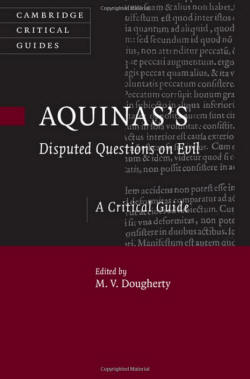Book Review
Aquinas's Disputed Questions On Evil:
A Critical Guide
Edited by M V Dougherty
Cambridge University Press (26 Nov 2015)
ISBN: 978-1107044340
 The
collection of essays found in this book examines Aquinas's Disputed
Questions on Evil from a variety of angles and will be of great interest
to those who wish to learn more about the theologian of the Catholic
Church. In their essay on Free Choice, Tobias Hoffman and Peter Furlong
examine what Aquinas believed was necessary for an action to possess moral
responsibility. For Aquinas, free choice requires two conditions:
sourcehood and the ability to do otherwise. A free act must spring from a
source that is internal to the agent. Omissions as well as acts may meet
the sourcehood condition. It is also noted that for Aquinas, the will
cannot be conditioned in one determinative way prior to choice. Otherwise,
there is no free choice. In contrast, the inclination of nonhuman animals
is conditioned in a determinative way and animals are therefore incapable
of free choice. How, asks Aquinas, is the will actualized? The will moves
itself to will the means to an end, by moving the intellect to deliberate.
From this, one can conclude that one controls how one conducts the
practical deliberations which leads to the choices made.
The
collection of essays found in this book examines Aquinas's Disputed
Questions on Evil from a variety of angles and will be of great interest
to those who wish to learn more about the theologian of the Catholic
Church. In their essay on Free Choice, Tobias Hoffman and Peter Furlong
examine what Aquinas believed was necessary for an action to possess moral
responsibility. For Aquinas, free choice requires two conditions:
sourcehood and the ability to do otherwise. A free act must spring from a
source that is internal to the agent. Omissions as well as acts may meet
the sourcehood condition. It is also noted that for Aquinas, the will
cannot be conditioned in one determinative way prior to choice. Otherwise,
there is no free choice. In contrast, the inclination of nonhuman animals
is conditioned in a determinative way and animals are therefore incapable
of free choice. How, asks Aquinas, is the will actualized? The will moves
itself to will the means to an end, by moving the intellect to deliberate.
From this, one can conclude that one controls how one conducts the
practical deliberations which leads to the choices made.
In their essay on Evil and moral failure in De Malo, Carl Still and Darren Dahl note that at the heart of moral failure is the will. Aquinas sees the will as both an appetite for certain kinds of objects and a capacity to choose among alternatives. For Aquinas, say the authors, evil is the privation of due perfection and privation is a potential being. The example given is of a zither player who fails to become proficient by being distracted watching television. Aquinas would see this failure to reach the end as resulting from the player seeking a more proximate end, of attaining pleasure. Aquinas sees privation as something positive, as a form that is contrary to a thing's due perfection.
In his essay on Venial sin and the ultimate end, Steven Jensen examines the role of the passions in moral deliberation. What motivates venial sin is something perceived to be inherently good but removed from its relation to the final end. For venial sin, as opposed to mortal sin, the agent is aware that he can retain his final end although performing the evil action. What motivates the sinner is some good perceived as ordered to the agent's overall good.
Recent years have seen an increased interest in Aquinas's Disputed Questions on Evil. This book helps us appreciate all that is distinctive about this great theological work.
Reviewed by Dr Pravin Thevathasan
